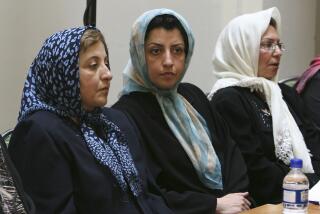Soviet Official Accepts Nobel Prize for Gorbachev
- Share via
OSLO — A Soviet deputy foreign minister accepted the Nobel Peace Prize on Monday on behalf of President Mikhail S. Gorbachev, who said in a message from Moscow that the world is still threatened by aggression and totalitarianism.
Gorbachev, the first Communist head of state to win the prize, had hoped to attend the ceremony in Norway in person, but he said that problems at home--including a food shortage, a collapsing economy and breakaway republics--now require his attention “hour by hour.”
In a ceremony at Oslo’s Town Hall, Soviet First Deputy Foreign Minister Anatoly G. Kovalyov collected the award--a gold medal, a diploma and a check for $715,000.
Kovalyov, who said the cash award probably would be donated to worthy causes, read a message from Gorbachev saying there is a “unique opportunity for reason and the logic of peace to prevail over that of war and annihilation.”
While the world moved toward peace in 1990, “there are some very grave threats that have not been eliminated: the potential for conflict . . . aggressive intentions and totalitarian traditions,” Gorbachev said in his message.
“I do not regard the 1990 Nobel Peace Prize as an award to me personally but as a recognition of what we call perestroika and innovative political thinking, which is of vital significance for human destinies all over the world.”
Gorbachev also said that perestroika , as his reforms are known, no longer belongs to Soviets alone but is “the property of the whole of mankind.” He thanked Norway, and the West, for supporting the Soviet Union’s struggle to adopt greater openness and reform.
The Norwegian Nobel Committee said the 71st Peace Prize recognized Gorbachev’s international efforts--helping to end the Cold War, smashing the hard-line Communist order in Eastern Europe, for example--more than his domestic policies.
In Moscow, dozens of demonstrators protested the award Monday, blaming Gorbachev for ethnic and political violence in his own country.
In Stockholm, Swedish King Carl XVI Gustaf handed out the gold Nobel Prize medallions and diplomas at a ceremony for the 10 laureates in medicine, literature, physics, chemistry and economics.
American chemistry laureate Elias J. Corey said that all of this year’s other laureates signed a telegram congratulating the Soviet leader on winning the Peace Prize.
“We, your fellow Nobel laureates of 1990, have decided unanimously to extend to you our congratulations and admiration for your contribution to peace on Earth,” they said.
The other 1990 laureates:
* Octavio Paz, Mexican writer and former diplomat, who won the Literature Prize.
* Harry M. Markowitz of New York, Merton H. Miller of Chicago and William F. Sharpe of Stanford University, who won the Economics Prize for pioneering work in the theory of financial economics and how markets function.
* Medicine Prize winners Joseph E. Murray of Milford, Mass., who made the first successful organ transplant in 1954, and E. Donnall Thomas of Seattle, whose work in bone marrow transplants led to a cure for most childhood leukemia.
* Richard E. Taylor of Medicine Hat, Canada, Jerome I. Friedman of Chicago and Henry W. Kendall of Boston, who shared the Physics Prize for experiments that helped prove the existence of subatomic particles called quarks and increased knowledge about the basic structure of the universe.
More to Read
Sign up for Essential California
The most important California stories and recommendations in your inbox every morning.
You may occasionally receive promotional content from the Los Angeles Times.













